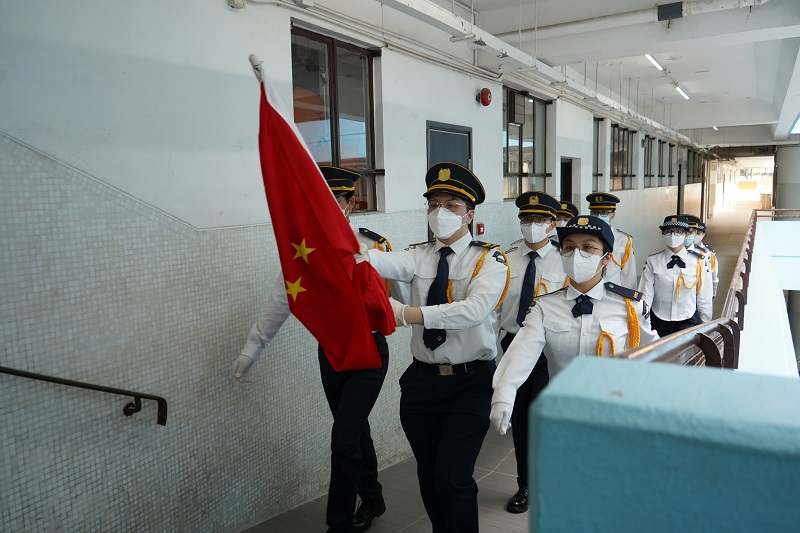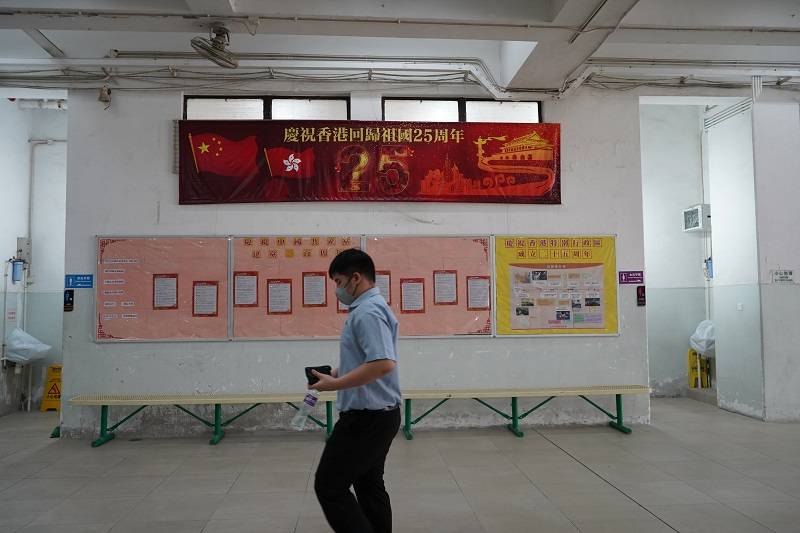Hong Kong schools tread cautiously in push to make students love China

Students march during a flag-raising ceremony at Hong Kong’s Scientia Secondary School on Sept. 16, 2022.
12:01 JST, October 8, 2022
HONG KONG – On a September morning at Scientia Secondary School in Hong Kong, the opening bugle call of the Chinese national anthem silenced student chatter in the assembly hall. Eyes ahead, five uniformed students marched onstage to raise and salute the red and gold national flag.
The somber attitude continued as teachers moved to the day’s main purpose: to mark the anniversary of the 1931 Mukden incident, when Japanese soldiers dynamited a Chinese railway as a pretext to invade the country. Faces hidden by masks, the students watched a black-and-white music video, PowerPoint presentation and news clippings, and remained standing for a minute of silence.
Such displays of patriotic allegiance and memorials for dark times in China’s history were rare in many Hong Kong schools only two years ago. After a national security law passed by Beijing in June 2020 put a swift end to pro-democracy protests, China’s leadership has turned its attention to fostering a new generation of Hong Kongers that is loyal to the nation and its Chinese Communist Party rulers. President Xi Jinping, who is expected to extend his rule at a meeting of top officials this month, has said that Beijing’s plan includes “special love and care” for the city’s youths.
The changes have contributed to a wave of emigration, with some citing fears of their children being “brainwashed.” Interviews with 11 teachers and parents reveal concern that Hong Kongers will no longer be taught to critically examine their society and political system, even as many say the government is treading cautiously so far, adopting a less heavy-handed approach than elsewhere in China.
Although the program in some respects has mirrored a patriotic education campaign conducted in mainland Chinese schools since the 1989 Tiananmen Square protests, the emerging approach in Hong Kong focuses less on Marxist and Maoist ideology and more on fostering a sense of Chinese cultural and historical affinity. The goal is to instill a sense of national belonging among the city’s youths and banish the distinct Hong Kong identity – accelerating a campaign that was a motivating factor for students like Joshua Wong to protest Beijing’s tightening grip.
In an interview after the flag-raising ceremony, Wong Ching-yung, Scientia’s principal, said that Hong Kong’s status as “special administrative region” requires a unique approach to national education.
Hong Kongers, he said, are less familiar with Communist Party history and would not accept an overly formal or overbearing approach, which could “easily lead to resentment, especially among teenagers, who are rebellious by nature.” Instead, Wong recommends telling stories that help students connect emotionally with mainland China.
Hong Kong officials, too, have indicated a gradualist approach. At a legislative council meeting in July, Education Secretary Christine Choi Yuk-lin said there is no rush when building a system of “emotion, recognition and values,” adding that “it takes 10 years to nurture a tree, but 100 years to train a man.”
Many schools use supposedly enjoyable activities – such as a competition for students to promote national security by using colorful artwork and uplifting messages – to deliver the pointed message about guarding against security threats. Government-published picture books emphasizing the legitimacy of the security law and police enforcement were given to kindergartens and primary schools as gifts. A patriotic education center, opened in July, holds screenings and talks to teach schoolchildren about the security law and the value of defending the state.
Zheng Wang, the director of the Center for Peace and Conflict Studies at Seton Hall University, said the government is “testing the waters” with promoting patriotic education and trying to “make their approach more suitable to Hong Kong society.”

At Scientia Secondary School in Hong Kong, a banner celebrates the 25th anniversary of the British handover of Hong Kong to China, and material on a display board addresses the 100th anniversary of the Chinese Communist Party.
The means may differ. But the goal, Wang said, is the same: to transform Hong Kong students into people loyal to China.
Despite the restrained approach, schools have been instructed by the government to infuse national security education into every subject, including physics and mathematics, such as by relaying examples of Chinese contributions to the field. They were “strongly advised” by the Education Bureau to organize events such as screenings of patriotic films or commemorating significant dates including the establishment of the party and the People’s Liberation Army.
Similar introduction of Beijing’s narrative is apparent in Hong Kong’s latest textbooks, which may avoid Marxist theory but are full of messages about Hong Kong’s prosperity being inextricably tied to the rest of China. One for the mandatory Citizenship and Social Development course, which replaced critical thinking-focused Liberal Studies, dedicates chapters to China’s 14th five-year plan, a 2003 economic agreement to boost mainland-Hong Kong trade and the Greater Bay Area plan to bind the territory with 10 mainland cities. Worksheet questions analyzed speeches of government officials, state media news excerpts, and discussed “how to increase the youth’s sense of belonging” to the Greater Bay Area. Instead of mainland China, the term “my country” is frequently used in one textbook.
Speaking in July on the 25th anniversary of Hong Kong’s return to China from British rule, President Xi said young people must “cultivate a sense of national pride.” His speech was later printed into booklets and distributed to schools.
Some teachers have resigned over the campaign. One, Katherine Lo, told The Washington Post that the new requirements forced teachers to present a whitewashed version of events, and she called that a violation of their professional ethics.
Because parts of the new program of education are not open for discussion, schools have lost a “free learning atmosphere,” said Lo, a liberal studies teacher who left her job this year. “There is no longer a reason for me to be a teacher here,” she said.
The Education Bureau has rewritten textbooks to say Hong Kong was never a colony and staged interschool quiz competitions on Hong Kong’s Basic Law, the territory’s mini-constitution, to which Beijing annexed its strict national security legislation.
One teacher of the Beijing-engineered citizenship and social development course, which was previously known as liberal studies, said the new syllabus omitted the discussion of local social problems that had previously inspired students to take an interest in current affairs. Instead, it spoon-feeds students dry accounts of Chinese law and the Politburo Standing Committee, which are “very abstract for the students,” said the teacher, who spoke on the condition of anonymity because of security concerns.
But the teacher still sees room to teach critical thinking, using worksheets, field trips or discussions outside of the required content. “Teachers will put in effort to filter messages and find ways not to make students suffer too much,” the teacher said.
For some parents, even a watered-down version of mainland patriotic education is too much. Elaine Lam left Hong Kong for Britain with her 6-year-old son in December because she feared “brainwashing” in schools. The trigger was when her son came home and said that he and the family were “not Hong Kongers,” after his kindergarten teacher had said the only appropriate term was “Hong Kong Chinese, according to official guidelines.”
“What makes me feel helpless is how [the Chinese government] has the only say. No one else is allowed to say anything different,” she said.
But Alvin Chan, a father of a 1-year-old, has chosen to stay in Hong Kong with his family. Born and raised in the colonial era, Chan, 41, said there is still room for his son to learn critical thinking independently in a restrictive educational environment – much as he did as he devoured history books and comics in his student years.
For now, he remains hopeful, although he acknowledges that this may be a “coping mechanism.”
He also signals resignation to the situation. “If there was an easier path to take, who wouldn’t choose that?” he said. “But in reality, there isn’t one.”





